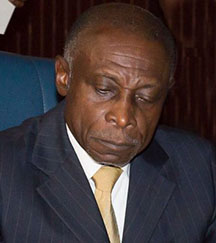In the wake of Venezuela’s freeze on the appointment of the new Guyana envoy, Foreign Affairs Minister Carl Greenidge yesterday said the exchange of ambassadors is important to promoting bilateral dialogue.
In a statement, Greenidge also defended Guyana’s right to speak on matters affecting its well-being and restated the country’s reliance on a United Nations-settlement of the ongoing border controversy between the two countries in spite of Venezuela’s actions on diplomatic appointments.
His statement was issued in wake of reports by Venezuelan media outlets, including those owned by the state, that President Nicolas Maduro has order-ed the suspension of the process to accredit Cheryl Miles due to what he said were offensive remarks made by Greenidge while in the United States.
“On the one hand, they (Guyana) ask us to approve their (designated) ambassador, and on the other hand, they destroy us, they attack us, and issue offensive statements against Venezuela and the Boliva-rian government,” Maduro was quoted as saying by El Universal.

Maduro was referring to statements made by Greenidge at the Florida Conference on Current Caribbean issues put on by the Institute of Caribbean Studies (ICS) and the Greater Caribbean Ameri-can Chamber of Com-merce, held last weekend in Miami, Florida.
“It is nonsense to initiate the diplomatic way of regularisation, the appointment and admission of ambassadors and suddenly go to the United States to launch attacks against Venezuela,” Maduro was quoted as saying. “We are a nation of peace and our Essequibo claim… will always go by way of international law, dialogue and truth,” he added.
In his statement yesterday, Greenidge reiterated Guyana’s readiness to engage Venezuela on bilateral matters.
“…We see the exchanging of ambassadors as being an important part of promoting such dialogue,” he said, while adding that notwithstanding Maduro’s actions the country is prepared to carry on the discussions.
“Whatever actions Venezuela takes in relation to ambassadors, we remain ready to adhere to the Geneva Agreement and we rely on the Secretary General [Ban Ki-moon] to make his decision as to the means of settlement of the controversy as defined in the Geneva Agreement,” Greenidge, however, added.
Right to speak
Greenidge also emphasised that not only does Guyana have a right to speak on matters affecting it but that his remarks in Florida were nothing new.
“As regards my statement in Florida, let me make it clear, Guyana has a right to speak on matters affecting it. Furthermore, I did not act on a sudden urge to visit the United States. I had a long-standing invitation to address Guyanese and interested persons in the USA on matters affecting Guyana and those of interest to the Caribbean. I was invited to Miami and what I said there differed in no way from what I said before, either in Miami or elsewhere, in defence of Guyana’s rights or in respect of Guyana’s position as regards the Vene-zuelan claim to Guyana’s territory and Venezuela’s actions. The latter has been amplified by the illegal action taken recently by President Maduro purporting to extend Venezuela’s land and sea boundaries to include Guyana’s maritime space,” he stated.
“This is a legitimate matter of concern to Guy-ana and indeed other Cari-com States, as it should be, and to the International Community as a whole. Venezuela must recognise that such actions, along with its pursuit of its spurious claim despite the restrictions of the Geneva Agreement, are the bases for Guyana’s response,” he added.
He also warned that Muduro’s “outbursts” every time Guyana speaks in defence of its rights come “perilously close” to revealing a belief that “uniquely, as a nation and as a people, we have no right, either to speak or to state our views on any matter affecting our well-being.”
A team from the United Nations visited Guyana at the end of last month for talks on government’s position on relations between Guyana and Venezuela and the ongoing border controversy.
“We are really here to inform ourselves of the views of the Governments (of Guyana and Venezuela) and their views on the next steps so that we can advise the Secretary General of the United Nations, who will then speak to the Presidents and craft a way forward,” Martha Doggett, Chief of the Americas Division in the Department of Political Affairs, who led the delegation, was quoted as saying after a meeting with President David Granger.
In May, Maduro issued a Decree claiming most of Guyana’s territorial waters along the Essequibo Coast, thereby triggering a deterioration in relations with Guyana. That Decree was subsequently withdrawn and replaced with a new one that was still offensive.
The Decree was issued after United States-based oil company Exxon Mobil announced that it has discovered significant evidence of oil in the Stabroek Block offshore Demerara.




